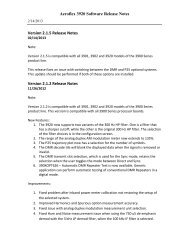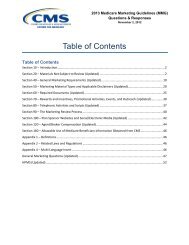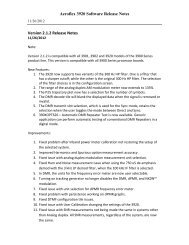White Paper Reforming the Asset-Backed Securities Market - The AMI
White Paper Reforming the Asset-Backed Securities Market - The AMI
White Paper Reforming the Asset-Backed Securities Market - The AMI
You also want an ePaper? Increase the reach of your titles
YUMPU automatically turns print PDFs into web optimized ePapers that Google loves.
done to enhance investor due diligence, to foster <strong>the</strong> development of independent analytical data<br />
providers, and to reduce reliance on rating agencies. To ensure <strong>the</strong> accuracy of <strong>the</strong> information,<br />
loan-level data offered by issuers, underwriters or assets servicers for investors should be<br />
accompanied by an auditor attestation verifying that <strong>the</strong> data has been properly aggregated,<br />
calculated and published. <strong>The</strong> loan-level data should be available in an electronically<br />
manageable and industry standardized format. After <strong>the</strong> deal is sold, all data fields in <strong>the</strong> preissuance<br />
disclosures and material information about <strong>the</strong> loan-level collateral in <strong>the</strong> pool should<br />
be updated and be similarly disclosed on a daily, or at least monthly, basis. <strong>The</strong> data already<br />
exists and <strong>the</strong> creation of standard data fields and automation of this process would create little<br />
regulatory burden.<br />
Capital markets would be less volatile if investors could fully model <strong>the</strong> expected<br />
performance of underlying loan-level collateral before a deal comes to market and, on a regular<br />
basis, assess <strong>the</strong> deviance from expectations. <strong>The</strong> provision of loan-level performance to<br />
investors on a regular basis would allow any degradation of performance to be observable and<br />
<strong>the</strong>refore priced in over incremental periods. By requiring that investors receive early and<br />
regular disclosures of all available information about collateral performance, <strong>the</strong> importance of<br />
NRSROs’ ratings will be diminished to <strong>the</strong> level of equity analysts’ research notes.<br />
<strong>The</strong> fact that investors have to pay to subscribe to services such as Loan Performance to<br />
get data on collateral underlying asset-backed securities <strong>the</strong>y are offered and may already hold is<br />
outrageous in light of <strong>the</strong> no-cost extensive public disclosure required for corporate securities.<br />
Arguments that <strong>the</strong> amount of loan-level information exceeds <strong>the</strong> capacity of investors to process<br />
and analyze – when issuers, underwriters and asset servicers have no problem processing and<br />
analyzing <strong>the</strong> very same data – are absurd on <strong>the</strong>ir face.<br />
2. Require a “cooling off” period when asset-backed securities are offered so that<br />
investors have sufficient time to review and analyze loan-level information before making<br />
investment decisions. Currently investors in primary offerings of asset-backed securities are<br />
forced to make decisions as to whe<strong>the</strong>r or not <strong>the</strong>y want to purchase immediately after deals<br />
come to market. As with existing SEC requirements relating to new issues of equity and debt<br />
securities, issuers should have to wait for a reasonable period of time before closing offerings of<br />
asset-backed securities. A two-week period would permit investors to properly analyze loanlevel<br />
collateral and independently determine whe<strong>the</strong>r projected performance expectations are<br />
adequate.<br />
3. Make deal documents for all asset-backed securities and structured finance<br />
securities publicly available to market participants and regulators. This will substantially<br />
increase market liquidity for such securities after <strong>the</strong>y are sold. In <strong>the</strong> lead-up to <strong>the</strong> financial<br />
crisis, even primary financial regulators could not analyze or even have access to deal documents<br />
of asset-backed and structured finance securities (e.g. CDOs) that <strong>the</strong>ir regulated institutions<br />
held. <strong>The</strong> common practice of making fundamental asset-backed and structured finance deal<br />
documents proprietary and subject to confidentiality obligations is fundamentally inconsistent<br />
with properly functioning capital markets and prudential regulation of financial institutions.









